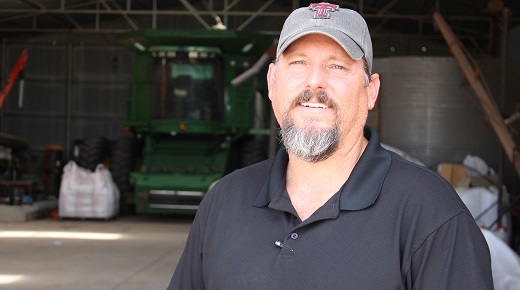A PUSH TO NEVER SETTLE LEADS TO ON-FARM SUCCESS
Cotton producers need a good offense and a good defense, and growers who switched to PhytoGen® brand varieties can have both.
Cotton producers need a good offense and a good defense, and growers who switched to PhytoGen® brand varieties can have both.
“Defense wins championships” is a favorite line for many coaches, but no one has ever taken home the trophy without putting points on the board. An either-or approach doesn’t get the job done.
Cotton producers need a similar mindset — you can’t settle for a good offense or a good defense. A winning season requires both, and growers who switched to PhytoGen® brand varieties have a lot to say about the deep bench they get with PhytoGen® cottonseed.
Ian McIntosh farms cotton and wheat in Floydada, Texas, and he started planting PhytoGen W3FE varieties because he wanted a new option for controlling weeds on the southern High Plains. He came for the weed control, but he soon found that PhytoGen brand varieties offer much more.
“I chose PhytoGen cottonseed with the Enlist weed control system because I knew glyphosate wasn’t the answer. With the Enlist weed control system coming out, I knew we had a shot at something new and getting the kill we wanted,” McIntosh said. “That’s what drew me to PhytoGen. Then it was the varieties and the vigor of the seed that kept me staying with them.”

Texas producer Ian McIntosh first planted PhytoGen® W3FE varieties so he could use the Enlist® weed control system. He soon discovered other advantages, such as outstanding early season vigor and consistently high yields at harvest.
Planting cotton always has its challenges, and you often can’t wait for perfect conditions. When an opportunity to plant comes, he has to be ready to move.
“You sometimes have a narrow window of optimal conditions, so you need strong seed that gets up and going,” McIntosh said. “When you stick PhytoGen cottonseed in the ground, it takes what little moisture you may have and it comes up.”
Once the crop is growing, the weed control is everything McIntosh expected — and more. But he said the real benefit comes at harvest with superior yields.
“PhytoGen varieties are tight in the bur, and if you have weather coming in at harvest, the cotton will be there for the cotton stripper,” McIntosh said. “The proof is the yield. I didn’t have trouble getting it up, I am able to keep the weeds under control, and I can make a consistently good crop.”
Like for most farmers with dryland acres in West Texas, the 2022 season was a tough one. But McIntosh remains positive as he looks to 2023.
“With PhytoGen, we had one of our best crops ever in 2021, and that set us up to make it through 2022,” McIntosh said. “We’re optimistic for 2023, and I plan on doing the same thing — planting these mid-maturing PhytoGen varieties that work really well in our area. We just need a little rain.”
On the other end of the Cotton Belt, producers John and Josh McCormick plant PhytoGen brand varieties for the strong variety lineup, but their challenge is root-knot nematodes (RKN). They discovered PhytoGen brand varieties in 2020 in an on-farm cotton variety trial.
“PhytoGen varieties were 100 to 200 pounds better than the most-widely planted competitive variety in our area,” Josh said. “That’s when we knew the game had changed. We were fools if we didn’t plant PhytoGen varieties after that.”
In 2021, the McCormicks planted 50% of their cotton acres to PhytoGen® W3FE varieties with resistance to root-knot nematodes. By August, there was a night-and-day difference compared with the competition.
“You could see how bad the nematodes were in the competitive cotton, and our biggest regret was that we didn’t plant the whole farm to PhytoGen,” Josh said. “PHY 545 W3FE made 1,250 pounds on dryland without a nematicide, and 100 yards away, we had a competitive variety treated with aldicarb that only made 800 pounds.”
The McCormicks say PhytoGen W3FE varieties bring many other benefits to the table: lower fertility needs because of established root systems, lower seeding rates from improved emergence and better soil health without nematicides.
“We have to do what works best for our farm for the sustainability of this farm,” John said. “We are seeking out knowledge and then we want to test it. We want to make progress on our bottom line, and these PhytoGen varieties help us do that.”
Find information on yield and more in the PhytoGen Cottonseed Agronomy Library.